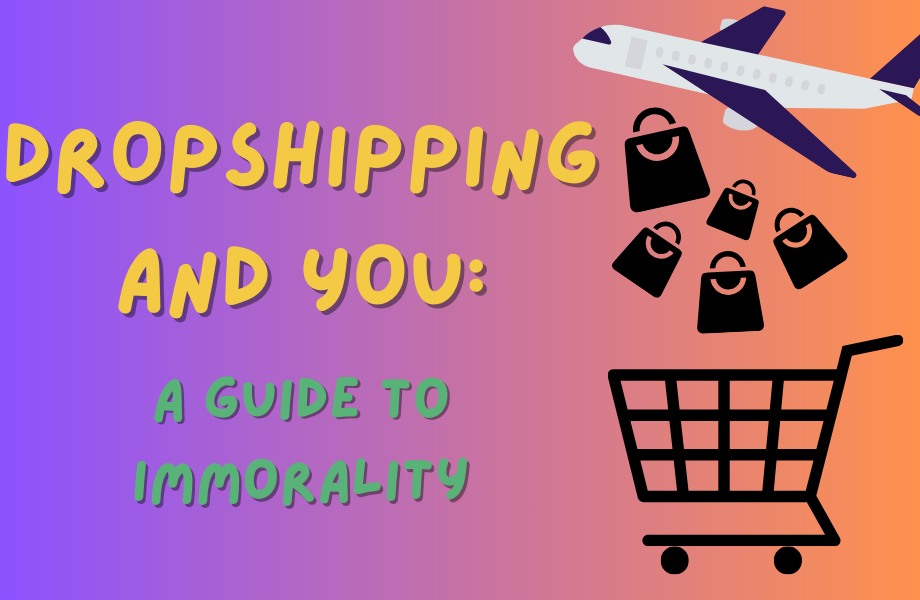I immensely dislike the TikTok shop. I don’t hate it, but I have a strong distaste for it. I don’t believe that a social media app should be advocating for dropshipping, fast fashion and poor quality. Here’s why:
Let’s start off with the first issue at play, dropshipping. For those who don’t know, dropshipping is a method of business where you don’t keep the product you are selling in stock, and you outsource production from another company. It’s essentially a middle-man operation. That isn’t my opinion, that is the direct definition of dropshipping Shopify describes on their website. Some call it business, I call it scummy. And I may even go on to say that these aren’t mutually exclusive.
The way it works is that you, the owner or employee of the business, start advertising a product that is cheap enough to be able to jack up the price on your website, app or commerce space, and make a profit. You can test the market on apps such as Temu, AliExpress, and of course, the TikTok Shop. By testing the market, you can find out how much demand there is for the specific product, whether it be a poorly made T-Shirt, threaded by the small ravioli sized fists of children overseas, or a heated hairbrush painstakingly wired by a different set of small ravioli sized fists from a child overseas. Depending on the amount of orders you get, you can then buy the product straight from the source, and then have the shipping address be theirs. Now this sounds like a standard business model where you have a manufacturing branch, except usually as a business owner you have to upkeep things like storage, the employees, and god forbid, legal applications. But this nifty and ever rising practice takes all of that off of your hands. If your manufacturer is known for using child labor practices, unhealthy working conditions or low quality products, you are not legally responsible as you are just a patron, and not a CEO. Now, corporations such as Amazon or Shopify say that this can be used so you as a business owner can focus on things like customer service and money management, but when is the last time you have ever gotten a message from a TikTok shop seller?
But let’s say that you aren’t dropshipping, and you just genuinely want to start a small business selling clay pots or some weird type of spoon that lets you eat twice as much in half the amount of time as a regular spoon. Even then, you will probably be thrown under the bus by the abundance of drop shipped products. What I find to be even more insane is that everything is always on sale. Constantly. It never stops.
Why is this? Well there are a couple theories. The first being that these are fake sales, and are never actually the price they say is being reduced. It isn’t a good deal, you are paying full price for a low quality product. Another reason is that this gives incentive to get people to buy the item quicker because the chances of the sale ending seem pretty high, despite it never happening. So while it might look like it’s half off for a limited time, it will never change. It’s things like this that make me not only hate the modern online shopping setting, but also shopping as a whole.
According to the Washington Post, this online marketing placebo affects thousands of people, and it has for many years on countless other sites. Look at Temu and Shien, two of the leading online stores known for their low prices. They have been at the forefront of fast fashion, dropshipping, and encouraging spending habits, and the TikTok shop is quickly rising the ranks.
From a business perspective, it makes sense to have a place for products on a media sharing website. Youtube has direct links to the top results to products or merchandise under videos, Instagram has advertisements every other Story you view, and Facebook has a whole community marketplace for you to view. Except TikTok has a built-in shop, similar to Temu, where people can directly purchase products without having to go to a secondary website, which sounds very convenient not only to consumers, but to entrepreneurs as well. This method can directly benefit TikTok, as outlets such as The Verge state they reportedly take 2% of profits, as well as a 30 cent transaction fee. This may not sound like a lot, but let’s look at the math.
I found a product ‘sold’ for $18, being sold at $9 , called the Unbrush Detangling Hair Brush. This product has 826,700 sales. That means that if the TikTok shop took 2%, they made a profit of $153,766 at minimum. This is only one of the thousands of items, and one of the cheaper options.
TikTok itself is making thousands of dollars off of stolen products, and it isn’t changing anytime soon. So, if you are actively buying from the TikTok shop, I don’t blame you to an extreme extent. Just know where your money is going, the true price and quality of these products, and the source they come from.



![Jumping off the ground, senior linebacker Bennett Patton snatches the ball out of the air for an interception at Thursday’s game against Chaparral. Patton had two interceptions in the 56-14 victory, tying the school record for interceptions in a game. “I was just playing the game,” Patton said. “[I’m] going to go into next week, forget about it and stay humble.” Photo by Harper Chapman](https://cphswolfpack.com/wp-content/uploads/2025/09/bennett-interception.jpg)
![The fire department came to the school after students were evacuated when smoke started coming from the ceiling of a classroom. All students and staff are safe. “All of my friends left their stuff too, so we couldn’t contact our parents, and it was stressful,” senior Brynn Fowler said. “It was scary because I didn’t know [what was going on], and I couldn’t find anyone because it was a big crowd.” Photo by Anthony Garcia](https://cphswolfpack.com/wp-content/uploads/2025/09/firetruck.jpg)


![Sitting with her friend senior Sohpia Struve at last year’s Austin City Limits Festival, senior Ava Zuniga poses for a picture under a pavilion. They are frequent attendees at ACL, an annual music festival at Zilker Park. “I would recommend seeing a bunch of people,” Zuniga said. “This past year, we camped out for Chappell [Roan] for a really long time. I think the whole point of ACL, [which] is a lot of fun, is that you can go see so many different people, even if you don’t know them. So by camping by one person, it really limits yourself from being able to go see a bunch of people.” Photo courtesy of Ava Zuniga](https://cphswolfpack.com/wp-content/uploads/2025/10/EE9E9484-FE6F-4AA0-B5F5-0C177AB32841-1200x857.jpeg)
![Broadcast, yearbook and newspaper combined for 66 Interscholastic League Press Conference awards this year. Yearbook won 43, newspaper won 14 and broadcast took home nine. “I think [the ILPC awards] are a great way to give the kids some acknowledgement for all of their hard work,” newspaper and yearbook adviser Paige Hert said. “They typically spend the year covering everyone else’s big moments, so it’s really cool for them to be celebrated so many times and in so many different ways.”](https://cphswolfpack.com/wp-content/uploads/2025/05/edited-ILPC.jpg)




![Looking down at his racket, junior Hasun Nguyen hits the green tennis ball. Hasun has played tennis since he was 9 years old, and he is on the varsity team. "I feel like it’s not really appreciated in America as much, but [tennis] is a really competitive and mentally challenging sport,” Nguyen said. “I’m really level-headed and can keep my cool during a match, and that helps me play a bit better under pressure.” Photo by Kyra Cox](https://cphswolfpack.com/wp-content/uploads/2025/09/hasun.jpg)


![Bringing her arm over her head and taking a quick breath, junior Lauren Lucas swims the final laps of the 500 freestyle at the regionals swimming competition on date. Lucas broke the school’s 18-year-old record for the 500 freestyle at regionals and again at state with a time of 4:58.63. “I’d had my eye on that 500 record since my freshman year, so I was really excited to see if I could get it at regionals or districts,” Lucas said. “ State is always a really fun experience and medaling for the first time was really great. It was a very very tight race, [so] I was a bit surprised [that I medaled]. [There were] a lot of fast girls at the meet in general, [and] it was like a dogfight back and forth, back and forth.” Photo by Kaydence Wilkinson](https://cphswolfpack.com/wp-content/uploads/2025/03/Kaydence-2.7-23-edit-2.jpg)
![As the support team sits and poses for a photo in the cafeteria with the counseling team they eagerly wait to start their day. "We [all] seem to be a team, I get up every day and there's days where I don't want to go to work today, but I'm thankful that I have a job and I'm blessed to have what I have," Christopherson said. Photo Courtesy of Julie Weltens.](https://cphswolfpack.com/wp-content/uploads/2025/01/AF9E8470-10D7-4C91-BF28-EC8F86BAB66C-1200x852.jpeg)
![Officer Stephanie Cash is in her second year as an SRO at CPHS. “Seeing [students] grow over the years has been kind of cool,” Officer Cash said. “Freshmen that [are] all over the place and then in the next couple of years get a little more squared away and go to class and do work and start thinking about the future. Being a part of a student's growth is the best way to measure my success as an SRO.” Photo Courtesy of Cedar Park Police Department's PIO, Alicia Gallagher.](https://cphswolfpack.com/wp-content/uploads/2024/12/CPHS-SRO-900x1200.jpg)
![As he sprints with the ball, senior running back Trae Hill breaks a tackle during Friday’s 35-14 loss against the Vandegrift Vipers. Hill ran for 135 yards and two touchdowns during the game. “[Scoring] was electric,” Hill said. “It always feels good to score, but the O-line did everything.”](https://cphswolfpack.com/wp-content/uploads/2025/09/IMG_0795allie.varfb_-1200x799.jpg)















